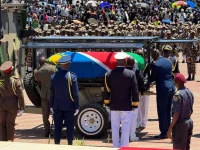Namibian citizens bid farewell to founding president Sam Nujoma during a state funeral at Heroes Acre cemetery last Saturday. The revolutionary leader, who guided the nation toward independence from apartheid South Africa, drew mourners nationwide starting early morning at 6 AM. People traveled extensively across the country to honor the man widely regarded as their founding father. Nujoma passed away on February 8 at age 95 after spending three weeks hospitalized in Windhoek.
Family members, including his widow, Theopoldine Nujoma, attended alongside children, grandchildren, and great-grandchildren. His eldest son, Utoni Nujoma, addressed attendees at a packed football stadium, describing his father as representing strength and wisdom for their family. He acknowledged they understood his limited availability resulted from his dedication to Namibian liberation. Despite grief surrounding his death, the family celebrated his fulfilling life and commitment to freedom across Africa.
The nation observed twenty-one days of mourning, with flags positioned at half-staff throughout. Authorities transported Nujoma's remains across seven different regions, including his hometown village, Etunda, located near Okahao. This nationwide farewell tour enabled hundreds of thousands of citizens to pay respects before the final interment. Nujoma represented the last generation of revolutionary African leaders who secured independence alongside figures such as Nelson Mandela, Samora Machel, Robert Mugabe, Julius Nyerere, and Kenneth Kaunda.
His flag-draped casket, bearing the inscription "Founding president and Father of the Namibian nation," descended into its final resting place accompanied by a twenty-one-gun salute and aircraft flyover performed by the Namibian Air Force. The Heroes Acre cemetery was established specifically to honor individuals making significant contributions to national freedom. Current President Nangolo Mbumba characterized Nujoma as extraordinary during memorial remarks, emphasizing his remarkable journey from rural beginnings to international leadership.
Distinguished guests included numerous African heads of state such as South Africa's Thabo Mbeki and Cyril Ramaphosa, Congo's Joseph Kabila, Zimbabwe's Emmerson Mnangagwa, Botswana's Ian Khama, Angola's João Manuel Gonçalves Lourenço, Tanzanian Vice President Philip Mpango, and Lesotho's prime minister Samuel Matekane. These leaders praised Nujoma as an African icon who steadfastly opposed colonial systems across the continent with unwavering principles throughout his life.
Following nearly thirty years living abroad as an exile, Nujoma returned home to lead the SWAPO liberation movement during United Nations-supervised elections held in November 1989. This democratic process subsequently elevated him to presidential office, where he served three consecutive terms from 1990 until 2005. Throughout his lifetime, he received numerous awards recognizing his exceptional leadership, courage and dedication toward establishing a nonracial society. He leaves behind three siblings, his wife, two sons, twenty-four grandchildren, and eleven great-grandchildren.
Family members, including his widow, Theopoldine Nujoma, attended alongside children, grandchildren, and great-grandchildren. His eldest son, Utoni Nujoma, addressed attendees at a packed football stadium, describing his father as representing strength and wisdom for their family. He acknowledged they understood his limited availability resulted from his dedication to Namibian liberation. Despite grief surrounding his death, the family celebrated his fulfilling life and commitment to freedom across Africa.
The nation observed twenty-one days of mourning, with flags positioned at half-staff throughout. Authorities transported Nujoma's remains across seven different regions, including his hometown village, Etunda, located near Okahao. This nationwide farewell tour enabled hundreds of thousands of citizens to pay respects before the final interment. Nujoma represented the last generation of revolutionary African leaders who secured independence alongside figures such as Nelson Mandela, Samora Machel, Robert Mugabe, Julius Nyerere, and Kenneth Kaunda.
His flag-draped casket, bearing the inscription "Founding president and Father of the Namibian nation," descended into its final resting place accompanied by a twenty-one-gun salute and aircraft flyover performed by the Namibian Air Force. The Heroes Acre cemetery was established specifically to honor individuals making significant contributions to national freedom. Current President Nangolo Mbumba characterized Nujoma as extraordinary during memorial remarks, emphasizing his remarkable journey from rural beginnings to international leadership.
Distinguished guests included numerous African heads of state such as South Africa's Thabo Mbeki and Cyril Ramaphosa, Congo's Joseph Kabila, Zimbabwe's Emmerson Mnangagwa, Botswana's Ian Khama, Angola's João Manuel Gonçalves Lourenço, Tanzanian Vice President Philip Mpango, and Lesotho's prime minister Samuel Matekane. These leaders praised Nujoma as an African icon who steadfastly opposed colonial systems across the continent with unwavering principles throughout his life.
Following nearly thirty years living abroad as an exile, Nujoma returned home to lead the SWAPO liberation movement during United Nations-supervised elections held in November 1989. This democratic process subsequently elevated him to presidential office, where he served three consecutive terms from 1990 until 2005. Throughout his lifetime, he received numerous awards recognizing his exceptional leadership, courage and dedication toward establishing a nonracial society. He leaves behind three siblings, his wife, two sons, twenty-four grandchildren, and eleven great-grandchildren.












